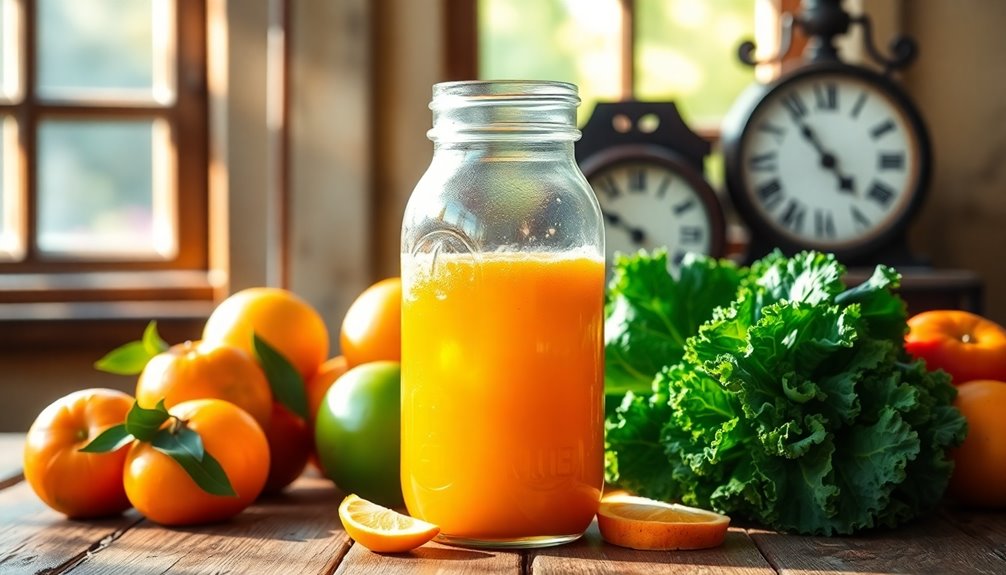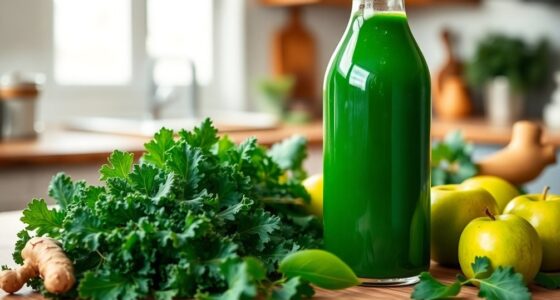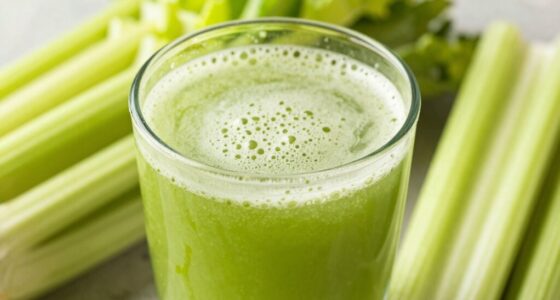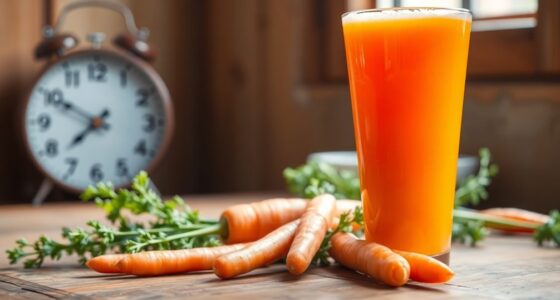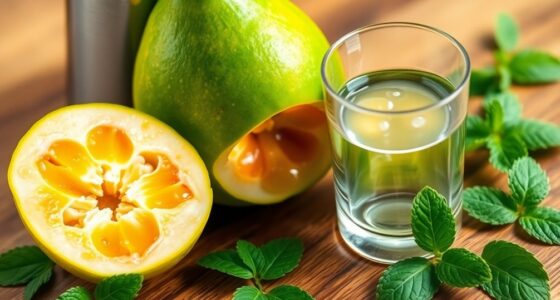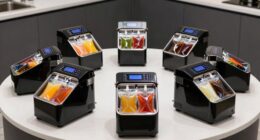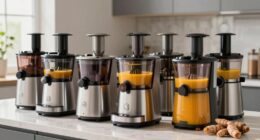Juice longevity depends on the type of juicer you use. Centrifugal juices last about 24 hours, while masticating juices stay good for up to 48 hours. If you opt for cold-pressed juice, it can last 3-5 days when stored properly in an airtight container in the fridge. Remember, oxidation affects freshness, so store your juice right after making it. Interested in tips to enhance freshness or maximize nutrition? There's more to discover!
Key Takeaways
- Centrifugal juice lasts up to 24 hours, while masticating juice lasts up to 48 hours.
- Twin gear and cold-pressed juices can last 4-5 days if stored properly.
- Use an airtight container to minimize oxidation and extend juice freshness.
- Refrigerate juice immediately after juicing to slow down degradation processes.
- Adding citrus juice can enhance flavor and act as a natural preservative.

When you juice, you want to enjoy the freshest flavors and nutrients, but how long can you actually keep that juice? The answer can vary quite a bit depending on the type of juicer you use and how you store your fresh juice. If you're using a centrifugal juicer, you'll typically find that your juice lasts up to 24 hours. While that might seem short, it's essential to understand that the juice's quality and nutritional content can degrade quickly due to oxidation.
If you opt for a masticating juicer, however, your juice can last up to 48 hours, giving you a bit more time to savor those vibrant flavors. If you're looking for even longer-lasting freshness, consider using a twin gear juicer like the Greenstar Elite. These juicers can extend the juice shelf life to an impressive 4-5 days. This longevity is largely due to their ability to protect against oxidation, which is a primary factor in juice spoilage.
Cold-pressed juice, which is another excellent option, generally has a shelf life of 3-5 days when stored properly in the refrigerator. With this method, you're not just getting great taste; you're also maximizing the nutritional content of your juice.
Now, let's talk about storage conditions. The way you keep your juice can significantly impact its longevity. Always use an airtight container to store your fresh juice. This simple step can help keep your juice from coming into contact with air, which is one of the main culprits behind oxidation.
If you're serious about extending the shelf life of your juice, it's best to store it in the refrigerator as soon as possible after juicing. Cold temperatures slow down the degradation process, allowing you to enjoy your juice for a longer period.
Another great tip for keeping your juice fresh is to add a splash of citrus juice. Citrus not only enhances the flavor but acts as a natural preservative, helping to extend the freshness of your juice. This can be particularly effective when you're juicing fruit juices that might've a shorter shelf life on their own.
Frequently Asked Questions
How Long Do Juices Last After Juicing?
When you juice, the freshness of your drink depends on the juicing method and storage.
If you use a centrifugal juicer, your juice is good for about 24 hours. Masticating juicers extend that to 48 hours.
Cold-pressed juice can last 3-5 days if stored properly, while twin gear juicers may keep it fresh for up to 4-5 days.
Always refrigerate your juice below 41°F (5°C) to maintain its quality and prevent spoilage.
Do You Have to Drink Juice Immediately After Juicing?
Juicing joyfully? You don't have to drink it immediately, but it's definitely a delightful decision!
Freshly squeezed juice is best consumed right away to maximize nutrients and minimize oxidation. If you can't sip it soon, remember that the type of juicer matters; centrifugal juice lasts about 24 hours, while masticating can stretch to 48.
Cold-pressed juice can keep for 3-5 days if stored properly, but fresh is always fabulous!
Can I Drink Pressed Juice After 3 Days?
You can drink pressed juice after 3 days, but you should be cautious.
Always check for signs of spoilage, like off smells or changes in color. If the juice was stored properly in an airtight container and kept refrigerated, it might still be safe to consume.
However, remember that freshness can vary based on the juicing method and ingredients used, so trust your senses before taking a sip!
What Is the 80/20 Rule for Juicing?
The 80/20 rule for juicing suggests you should aim for 80% vegetables and 20% fruits in your juice.
This balance helps you get more vitamins, minerals, and antioxidants while keeping sugar levels lower. By incorporating a variety of leafy greens and low-sugar fruits, you enhance your juice's nutritional value.
This approach not only promotes better digestion but also provides sustained energy, making your juicing practice both healthier and more enjoyable.
Conclusion
In conclusion, fresh juice can last up to 24 hours in the fridge, but for the best taste and nutrients, drink it sooner rather than later. Store it in an airtight container, keep it cool, and savor the freshness. Remember, the quicker you consume it, the better the flavor, the more nutrients you'll retain, and the healthier choice you'll make. So, grab that glass, enjoy every sip, and embrace the vibrant energy of your freshly squeezed juice!
Cindy thoroughly researches juicing trends, techniques, and recipes to provide readers with practical advice and inspiration. Her writing style is accessible, engaging, and designed to make complex concepts easy to understand. Cindy’s dedication to promoting the advantages of juicing shines through her work, empowering readers to make positive changes in their lives through the simple act of juicing.

